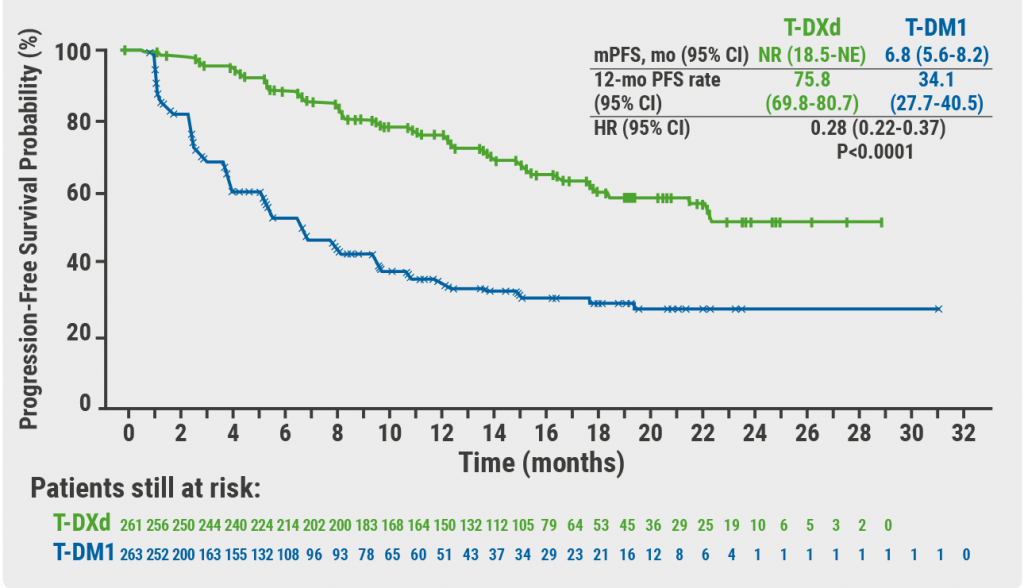The global head-to-head, open-label, randomised, phase 3 DESTINY-Breast03 study (NCT03529110) interim analysis was presented by Dr Javier Cortés (International Breast Cancer Center Barcelona, Spain) [1]. DESTINY-Breast03 evaluated the safety and efficacy of T-DXd (n=261; 5.4 mg/kg) versus T-DM1 (n=263; 3.6 mg/kg) in patients with HER2-positive unresectable and/or metastatic breast cancer previously treated with trastuzumab and a taxane, primarily as their first-line treatment. The primary endpoint of DESTINY-Breast03 was progression-free survival (PFS) based on blinded independent central review. Secondary efficacy endpoints included overall survival (OS), PFS based on investigator assessment, objective response rate, duration of response, clinical benefit rate, and safety.
After 15.5 and 13.9 months of follow-up in the T-DXd and T-DM1 arms respectively, blinded independent central review determined that the median PFS for patients treated with T-DXd was not reached compared with 6.8 months for T-DM1 (HR 0.28; P<0.0001; see Figure). The key secondary endpoint of PFS assessed by investigators showed that patients treated with T-DXd experienced a 3-fold improvement in PFS of 25.1 months versus 7.2 months with T-DM1 (HR 0.26; P<0.0001). PFS benefit was consistent across key subgroups of patients treated with T-DXd, including those with a history of stable brain metastases. Differences in estimated 12-month OS (94.1% with T-DXd vs 85.9% with T-DM1) did not cross the pre-specified boundary for significance (HR 0.56; 95% CI 0.36–0.86) but showed a strong interim trend, and will be followed up as the data mature.
Figure: PFS determined by blinded independent central review, the primary endpoint of DESTINY-Breast03 [1]

The safety profile of the most common adverse events with T-DXd in DESTINY-Breast03 was consistent with previous data, and no new safety concerns were reported. Interstitial lung disease was reported in 10% of the patients in the T-DXd arm, versus 2% in the T-DM1 arm, yet these numbers are lower than described in earlier trials with T-DXd.
The designated discussant, Dr Shanu Modi (Memorial Sloan-Kettering Cancer Center, New York, USA) declared, “The efficacy seen in this trial is unprecedented.”
- Cortés J, et al. Trastuzumab Deruxtecan (T-DXd) vs Trastuzumab Emtansine (T-DM1) in Patients (Pts) With HER2+ Metastatic Breast Cancer (mBC): Results of the Randomized Phase 3 DESTINY-Breast03 Study. Abstract LBA1, ESMO Congress 2021, 16–21 September.
Copyright ©2021 Medicom Medical Publishers
Posted on
Previous Article
« Novel conjugate meets primary endpoint Next Article
Lower rates of TAVR in neighborhoods with higher numbers of minorities, poor »
« Novel conjugate meets primary endpoint Next Article
Lower rates of TAVR in neighborhoods with higher numbers of minorities, poor »
Table of Contents: ESMO 2021
Featured articles
Breast Cancer
Trastuzumab deruxtecan triples PFS
Novel conjugate meets primary endpoint
Longest survival benefit from first-line CDK4/6 inhibitor
Meta-analysis shows 6-months adjuvant trastuzumab is optimal
Double-positive results for triple-negative metastatic breast cancer
Survival after neoadjuvant therapy with trastuzumab-lapatinib plus chemotherapy
Postmenopausal breast cancer: extended letrozole reduces recurrence
Asian women also benefit from palbociclib plus letrozole
No PEARLs of survival with palbociclib plus endocrine therapy compared with capecitabine, but QoL better
Gastrointestinal Cancer
Neoadjuvant chemotherapy potential alternative to neoadjuvant chemoradiotherapy in LARC
Immune chemo-sensitisation looks promising in microsatellite-stable mCRC
Adagrasib shows promising clinical activity in heavily pretreated KRAS-mutated CRC
Automated detection of microsatellite status on unstained samples in early colon cancer
Consistent benefit of anti-PD-1 therapy for oesophageal and gastric cancer
HIPEC in gastric cancer with peritoneal metastases
ctDNA highly predictive in HER2-positive, advanced gastric or gastro-oesophageal junction cancer
Lung Cancer
Robust anticancer activity of trastuzumab deruxtecan in HER2-mutated NSCLC
Nivolumab/ipilimumab continues to provide survival benefit in unresectable MPM
Adjuvant atezolizumab lowers relapse rate in resected NSCLC
Three-year OS follow-up from CASPIAN trial
TCR clonality predicts pembrolizumab response in NSCLC
Melanoma
Adjuvant immunotherapy reduces risk of disease recurrence in stage II melanoma
IFN-γ signature predicts response to immunotherapy
Updated results of SECOMBIT trial
Combining T-VEC and pembrolizumab does not significantly improve survival in advanced, unresectable melanoma
Durable intracranial responses with nivolumab/ipilimumab
Genitourinary Cancer
TKI drug-free interval strategy not detrimental to conventional continuation strategy in RCC
Modified ipilimumab schedule reduces risk of grade 3/4 adverse events
Optimal neoadjuvant dose ipilimumab/nivolumab in stage III urothelial cancer
Better survival with neoadjuvant dose-dense MVAC regimen in MIBC
PARP inhibitor rechallenge improves PFS in ovarian cancer
Pembrolizumab prolongs survival in persistent, recurrent, or metastatic cervical cancer
Pembrolizumab has durable effect in previously treated MSI-H/dMMR advanced endometrial cancer
HRR mutational status is prognostic and predictive biomarker olaparib activity
Haematological Cancer
Mutational analyses are predictive in malignant lymphomas
Low numbers of M2 macrophages in tumour microenvironment associated with superior response to immunotherapy in Hodgkin lymphoma
COVID-19
Adequate response to SARS-CoV-2 vaccine in cancer patients
Cancer patients more likely to die from COVID-19 when hospital admittance is required
Third global survey of the ESMO Resilience Task Force
High COVID-19 mortality in Swiss cancer patients
Basic Science & Translational Research
Neutrophils negatively correlate with response to anti-PD-1 monotherapy in dMMR tumours
Tetraspecific ANKETs harnesses innate immunity in cancer therapies
Early ctDNA reduction in metastatic uveal melanoma correlates better with OS than RECIST response
Gut microbiota as a potential predictive biomarker
Related Articles

November 19, 2021
BrighTNess data may change guidelines
November 19, 2021
Double-positive results for triple-negative metastatic breast cancer

© 2024 Medicom Medical Publishers. All rights reserved. Terms and Conditions | Privacy Policy

